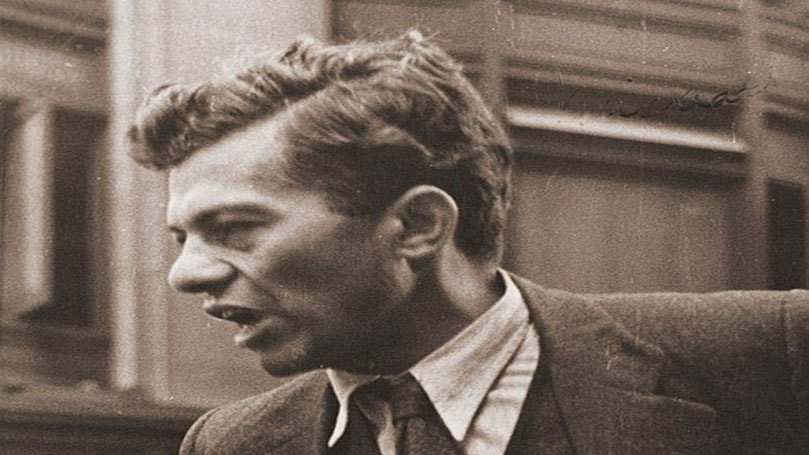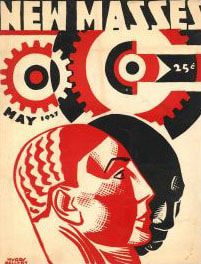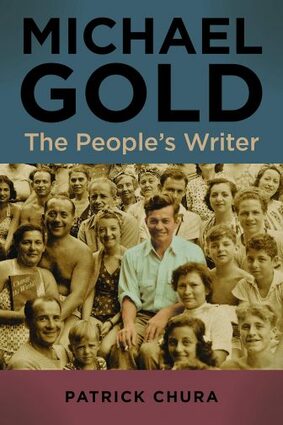|
In the pantheon of 1930s revolutionary writers, Michael Gold has too long faltered on the historic periphery. A close associate of Hemingway, Reed, O’Neill, Hughes, St. Vincent Millay, Claude McKay, John Dos Passos, Dorothy Parker, Richard Wright, Carl Sandburg, Upton Sinclair, and James T. Farrell, Gold was not only overshadowed by the celebrity of others but blighted by decades of enduring discord from within and rabid anti-communism from without. And while his novel Jews Without Money (1932) was a bestseller, catapulting him to grand renown in his time, Gold’s own story has been painfully disappeared. Writers on the political left, in any case, have always looked to the breadth of Mike Gold’s mission: fiction writer, poet, playwright, prolific journalist and Daily Worker columnist, editor of New Masses and multiple other journals, he was also a champion cultural organizer and inspiring public speaker. Odd, that with so much literary adoration about him, with equal amounts of derision from other quarters, Gold’s biography would arrive at this late juncture. But given the depth of quality in Patrick Chura’s Michael Gold: The People’s Writer, the long, ridiculous wait was worth every decade. Chura, an English professor at the University of Akron, tore into the definitive research to tell the story, enliven the realities, and reveal the hidden. The biography, written not in the language of the academic but more in narrative fashion, glows with the evidence of investigative details. Chura shows an ability to absorb streams of reportage, unpublished poetry, early pencil visions of fiction, memoir notes, letters, seemingly lost first drafts as well as overlooked and forgotten works of a certain stature. It’s all here. As biographers are wont to do, Chura exposes the reader to the days of his subject, offering not only facts and analysis, but the ability to see these through Gold’s eyes — to feel the sweat and survive the strain of his often conflicted life. As told by Chura, Gold’s early life of poverty was centered around his family home, a crowded, nearly airless flat infested with lice and crushing dysphoria. Born Itzok Granich in 1894, Gold faced long hours of childhood labor when his ailing, bed-ridden father lost his struggling business, and the family became destitute. An excerpt of one of his earliest writings stated, “The streets of the East Side were dark with grey; wet gloom; the boats of the harbor cried constantly, like great bewildered gulls, like deep booming voices of calamity.” Much later, Gold would write of his formative years: “It was in a tenement that I first heard the sad music of humanity rise to the stars. The sky above the airshafts was all my sky; and the voices of the tenement neighbors in the airshaft were the voices of all my world. There, in my suffering youth, I feverishly sought God and found Man.” Chura may not be a New Yorker, but his book is a true snapshot of the city’s streets and shadows over the lengthy period bridging the early 20th century and Gold’s later years but in particular his 1920s–40s period of greatest activity. The reader is walked through 102 West 14th Street, then headquarters of the John Reed Club, and the offices of the Communist Party at 35 East 12th Street. It’s no small irony that rent for a single bedroom apartment in either now tops $5,000 per month, and apartment sales in the latter recently averaged more than $4 million. Chura also brings alive Gold’s radicalization as a teen, his early publication in the Masses, grave financial and emotional struggles while briefly at Yale, his journalist roots, youthful membership in the Provincetown Players, relationship with Dorothy Day, unfailing dedication to the Communist Party, and founding of the New Playwrights. But Gold’s “creative writing” was never confined to poetry, fiction, or drama. In his 1921 article “Towards Proletarian Art,” Gold eloquently warned that “a mighty national art cannot arise save out of the soil of the masses.” And of the Sacco and Vanzetti executions in 1927 Boston, he presciently reported, “It is August 14th, eight days before the new devil’s hour. . . . I am writing this in the war zone, in the psychopathic respectable city that is crucifying two immigrant workers . . . respectable Boston is possessed with the lust to kill . . . the subconscious superstition that the death of Sacco and Vanzetti can restore their dying culture and industry. At last, they have a scapegoat. . . . They are insane with fear and hatred of the new America.” This packed biography also reveals the protagonist’s battles with major depression and his lesser-known literature, including previously lost or forgotten verse and his 1929 collection 120 Million (after Vladimir Mayakovsky’s 150,000,000), long out of print. Gold’s numerous speaking engagements are cited, including some specific moments experienced at lecterns here and abroad. Such details feed into international travel, not the least of which was to Kharkov in the Soviet Union for the International Union of Revolutionary Writers conference and Paris for the First International Congress of Writers for the Defense of Culture. Interactions with European notables including Andre Gide, E. M. Forster, Vsevolod Meyerhold, and Vladimir Mayakovsky, poet laureate of the Soviet Union, are also highlighted. And while it’s clear that the author remains a proponent of Mike Gold, the many conflicts surrounding the man are here examined with jarring clarity. Though deeply committed to both the Communist Party USA and the wider Communist International, Gold’s rebellious, unbridled nature never allowed for the discipline exhibited by other party officials. The missed meetings and avoided functionary duties soon clarified that Gold’s decades as a revolutionist began in the company of anarchists. Ironically, his fights against party bureaucracy were eclipsed by the attacks he launched on progressive and liberal writers who’d apparently strayed from the mission. This combination — and a constant rain of blows from the right — established an array of opponents that stretched over a lifetime. Following early battles with Masses’ editor Max Eastman, his association with Claude McKay, too, became embittered (though he described McKay’s sonnets as “crystal songs”). Gold’s editorials railed against Gertrude Stein and sought to shred Thornton Wilder, but a particular hellishness was saved for former friends, most blatantly Ernest Hemingway. After publication of For Whom the Bell Tolls, Gold’s review called the book “a minor story” despite its “narrative genius,” as it was “so painfully fair to fascists.” The heroic figure of Robert Jordan, according to Gold, was ignorant of the class conflict in Franco’s Spain, which Gold saw as central to the story. Famously, Hemingway left a message at the New Masses office directing the critic to “go fuck himself.” In his book, The Hollow Men, an overview of writers he saw as having turned their backs on the revolution, particularly those originating from wealthier backgrounds (yes, he wrote of “Ernest Slummingway”), Gold’s opinions were unfettered, often bloodthirsty in the pursuit of forging an all-important literary force toward an egalitarian society and in opposition of fascism. Following word of the 1938 Moscow purges and, most painfully, the German-Soviet Nonaggression Pact a year later, Gold was in the grip of conflict over what we later came to see as Stalin’s despotism. Yet, following his own advice to young writers, Gold would “write, persist, struggle,” toeing the party line through his doubt. During the worst of the Second World War, he became a constant source for the fight against fascism, and though a target of the Dies-led House Committee on Un-American Activities and constantly profiled by the FBI, Gold maintained a busy literary schedule in writing and editing. This sense of mission was maintained through his last, despairing years. While Gold was never to complete the second novel he’d long planned, his “Change the World” column was maintained through 1966, and the artful quality of his work remained glaringly so. He died in May 1967 after more than a half-century of embodying the cultural worker. Michael Gold, always one to analyze Marxian, seeking the wider, greater reality, wrote near the end of his life of the blacklist and McCarthy terrors, citing on manifold levels: “The lined faces which had seen the trouble and white hair as the result of sleepless nights. . . . We had lost all our youth.” Published in People’s World, May 18, 2021. Image: Mike Gold, Wikipedia (CC BY-SA 3.0). AuthorJohn Pietaro is a cultural worker and labor organizer from New York. He is a contributing writer to the People's World, Political Affairs, Z Magazine, Portside and other progressive publications. As a performer, John has shared the stage with artists such as Pete Seeger, Alan Ginsberg, Amiri Baraka, David Rovics, Fred Ho, Bev Grant, Anne Feeney and Ray Korona. His website is www.flamesofdiscontent.org. This article was published from CPUSA. Archives May 2021
0 Comments
Leave a Reply. |
Details
Archives
July 2024
Categories
All
|



 RSS Feed
RSS Feed